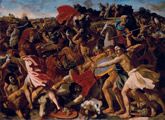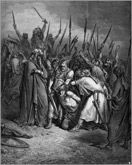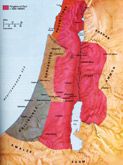
by: Rev. Cheryl L. Hauer, International Development Director

The dictionary defines war as “a state of armed conflict between different nations or states or different groups within a nation or state.” Of the 192 United Nations member states, all have been involved in such a conflict at one time or another. The UN further estimates that there are currently somewhere between 39 and 45 armed confrontations raging worldwide at any given moment. Of all of those conflicts, however, none seems to attract as much attention as those thrust upon the nation of Israel.
For such a tiny state, it seems Israel has always attracted a great deal of attention throughout the ages. Even though the country has little to offer in terms of natural resources, its capital city has been conquered over 27 times in its history. For millennia, the nation was either in a state of armed conflict or suffering at the hands of occupying armies or absentee landlords. From ancient Egypt to the Roman Empire, Persia to the Ottoman Turks, Israel has never lacked for enemies. For Jewish people living in the Diaspora, the situation has historically often been as bleak. Today, anti-Semitism is at an all-time high in many parts of the world, and the nation of Israel is under threat from virtually every corner.
It would seem, then, if we were to ask the Jewish community who Israel’s greatest enemy has been, we would get a variety of answers. We might expect to hear names like Adolph Hitler, Ahmadinejad, Hamas, or even Sennacherib (the Assyrian king of Bible times, 2 Kings 18–19). However, we might be surprised to hear that many believe Israel’s greatest foe today to be the very same enemy they have faced throughout all of history: Amalek.

The Amalekites were a nomadic nation living in the southern region of the land of Canaan and at times occupying the pasturelands of the Negev. Amalek, their leader, was the illegitimate son of Eliphaz, son of Esau. In Genesis 25:29–34, we read the familiar story where Esau sold his inheritance to his brother Jacob. As the firstborn son, that inheritance would have included all that belonged to his father and would have made Esau, rather than Jacob, the bearer of the covenant promises God had made to Abraham. However, Esau surrendered that legacy for a bowl of lentils. The rabbis point out that Esau, though he might have been a little hungry, was neither ill nor starving. He was a healthy young man living within a family that was prosperous and would have had everything that he needed. His willingness to sell his birthright in such a manner is indicative, they say, of nothing less than callous disregard for its importance. Esau was flippant and disrespectful of the traditions of his father and had little regard for his future. Yet, he blamed his brother for his own loss, hated him and determined to kill him.

“Siege and Destruction of Jerusalem” – David Roberts
Esau taught his grandson Amalek that same hatred toward Jacob and his descendants and encouraged him to pursue and destroy them. The Midrash (Jewish homiletic method of biblical exegesis) says that when Esau was getting old, he called in his grandson Amalek and said, “I tried to kill Jacob but was unable. Now I am entrusting you and your descendants with the important mission of annihilating them—the Jewish people. Carry out this deed for me. Be relentless and do not show mercy.”

“Morte Agag” – Gustave Doré
Israel’s first encounter with this archenemy is recorded in Exodus 17:8–16. Having fled the oppression of the Egyptians and the armies of Pharaoh, the Israelites began their wandering in the desert and were attacked by the Amalekites in Rephidim. No provocation for this attack is given, and it is clear that the Lord regards it as particularly heinous. Joshua is instructed to lead the army in battle while Aaron and Hur uphold Moses’ arms “until the going down ofthe sun,” bringing victory to Israel. It is in verse 16 that we are told “the Lord will have war with Amalek from generation to generation,” or as the rabbis interpret the passage, perpetually.
This incident is recounted in Deuteronomy 25:17–19. Here, the Lord commands His people to remember their encounter with Amalek. The attack, He says, was not only unprovoked but vicious in its focus on the weak, the stragglers at the rear of the assembly, the tired and the weary. The Lord emphasizes that Amalek had no regard for Him or for the special status of His people. The simple reason, the rabbis say, is that Amalek was following the instructions of his grandfather. The attack was not the result of concern over property, boundaries, or water supply. It was the result of unmitigated hatred for the descendants of Jacob. Therefore, God says, you shall not forget, but rather you must possess your inheritance “that you will blot out the remembrance of Amalek from under heaven.”
This, the sages tell us, was only the beginning. The progeny of Amalek were to become the archetypal enemy of the Jewish people. Their very existence would always be diametrically opposed to Torah(Gen.–Deut.), which honors God and teaches His people to live in covenant with Him. The Talmud(rabbinic commentary) states that the throne of God will never be fully established until the seed of Amalek—the principle of hatred and wrongdoing—is destroyed forever. Clearly, the rabbis state, the people of Amalek are the essence of all the evil in the world.

The Hebrew Scriptures recount many confrontations between the Israelites and the Amalekites, and they were sometimes victorious, slaughtering and plundering God’s people. They were unrelenting in their hatred and open to alliance with others who were hostile to Israel. The Moabites, the Ammonites, and the Kenites were but a few of those that would join the Amalekites in their attempts to destroy the descendants of Jacob. However, God sometimes favored the armies of Israel with victory over their archenemy. Saul captured the Amalekite king, Agag, and destroyed his people by the sword. 
Sometime later, David waged a war against them as told in 1 Samuel 30. Here again, we encounter the cowardice of the Amalekites who attacked David’s village when he and his men were engaged in battle elsewhere, plundering and taking the women and children as spoils of war. David is able to overcome them and retake the captives and spoils, destroying many and causing the rest to flee. In 1 Chronicles 4:42–43, we are told that in the time of Hezekiah, 500 Simeonites annihilated the last remnant of those Amalekites that had settled on Mount Seir. This was by no means the destruction of the Amalekites from under heaven, however.
We are introduced to one of Amalek’s more famous descendants in Esther 3:1. Here, Haman is identified as a relative of Agag, king of Amalek. Haman’s desire to utterly destroy the Jewish people was an expression of his long-standing national tradition, his familial inheritance. Throughout history, tradition has attached actual Amalekite ancestry to many of Israel’s enemies, including Hitler and Kaiser Wilhelm of Germany.
There is a basic understanding in many streams of Judaism that what is happening in our material world is actually a reflection of what is happening at an unseen spiritual level. Wars are fought at both levels, and victory has much more to do with spirituality than physical strength. A nation stands or falls based on its spiritual nature. The rabbis teach that there is a great difference between the spiritual nature of Amalek and that of other nations. They say the spirit of Amalek is Samael, the angel of evil, or Satan himself.
The sages point out that in Exodus 17:16, God swore that He would destroy Amalek. Later, however, in Deuteronomy 25:19, He commands His people to do so. If God had promised to rid the world of Amalek, why did He then give His people the commandment to do it themselves? In the case of all other nations, it is God who fights the battle at the spiritual level, leaving His people to take care of the physical. However, the rabbis say, with Amalek it is the opposite. The people of God must destroy the spirit of Amalek. And how is that to be accomplished?
When Isaac blessed his son Jacob in Genesis 27:22, he said, “The voice is Jacob’s voice but the hands are Esau’s hands.” This means, the sages say, that when Jacob is lax in his study of Torah, in prayer and good deeds, Esau’s hand becomes stronger. When we are lax in our service to God, the spirit of Amalek gains strength, and as long as that spirit remains strong, it cannot be obliterated from under heaven. So, the rabbis say, it is the responsibility of God’s people to live lives of humble godliness, free from sin, and therefore depriving the spirit of Amalek of the power he needs to be victorious.
Another spiritual application is found by looking at the phrase, “how he met you” found in Deuteronomy 25:18. The word “met” in Hebrew is karchaand literally means coincidence. This indicates, the rabbis say, that Amalek’s entire philosophy of life is that there is no design or providence, only luck and fate. That is why the verse continues, “and he did not fear God.”

“Haman Begging the Mercy of Esther” – Rembrandt
On the other hand, the descendants of Jacob represent conscience and morality. The world has purpose and meaning, and every individual is created in the image of God. From this foundation, the Jews introduced to the world concepts like monotheism, equality for all people, and education for everyone. This is the essence of what Isaiah describes as being a “light unto the nations.” While Jacob believes that God runs the world and there is an absolute standard of morality, Esau represents a belief in the random, with subjective morality. The Jews stand for the principle of caring for the vulnerable and weak in a world ordered by the Almighty. The spirit of Amalek is the opposite, attacking those trailing behind and pulling them into a world of chaos.
One final spiritual lesson comes to us from the Chassidic tradition. After the Jewish people experienced an overwhelming demonstration of the power of God—through ten supernatural plagues, the splitting of the Red Sea and manna raining from heaven—they were delivered from the greatest power on earth at the time and cared for in the harshest of environments. Yet their relationship with God was marked by repeated doubt and unbelief, doubt that was irrational based on their experiences and more powerful than reason. It was this doubt that left the Jewish people susceptible to attack from Amalek.
The Talmud says: What is the incident of Amalek comparable to? To a boiling tub of water which no creature was able to enter. Along came one evildoer and jumped into it. Although he was burned, he cooled it for others.
So too, when Israel came out of Egypt, and God split the sea before them and drowned the Egyptians with it, the fear of them fell upon all the nations. But when Amalek came and challenged them, although he received his due from them, he cooled the awe of the nations of the world for the people of Israel.
So today the battle between the spirit of Amalek and the people of God is one of truth against falsehood. It is only the truth of God that can prevail over man’s selfish drives and desires and that can overcome the material temptations and self-interest, which impede man’s ability to behave in a manner that pleases God.
But, says Rabbi Shraga Simmons, man’s rational faculties are powerless against the challenge of an Amalek who leaps into the boiling tub, mocks the truth, and cools man’s most inspired moments with nothing more than a dismissive, “So what?” Amalek doesn’t challenge the truth with arguments—he just disregards it. To God’s injunction to love what is true, Amalek responds with apathy and cynicism.

Judaism is not the only religion that lends considerable importance to Amalek. As in many other areas, Islam’s view regarding him was strongly influenced by both Judaism and Christianity. Muslim teaching on the early history of the Amalekites is very similar to that of Judaism; however, many Arabic and Islamic writers over the centuries have invented stories about this ancient people, claiming without historical evidence that they ruled over Arabia and the surrounding countries, especially over Egypt. Until recently, the focus has been geographical and political, painting a rather romantic picture of the Amalekites as an Arabian tribe that swept into the area of Canaan from time to time to trade, find wives, and perhaps make war. But in recent times, many Islamic writers have changed that picture to one of the Amalekites as unfortunate victims of “Israeli genocide,” failing to address any historical or biblical context to underscore God’s injunction to destroy Amalek from under heaven.
Although Christians who interpret the Bible literally have certainly acknowledged Amalek as a real historical figure, most of Christianity came to view him as a type of the hostility of the world to the kingdom of God. In his book Bible History, Alfred Edersheim laid the groundwork for that typology: “The contest of Amalek therefore must have been intended, not so much against Israel simply as a nation, as against Israel in their character as the people of God. It was the first attack of the kingdoms of this world upon the kingdom of God, and as such it is typical of all that has followed since.”

Hamas in Gaza www.israelimages.com /Yasha Mazur
Building on that typology, many pastors today teach that Amalek is a type of the flesh, representing all that is evil in the nature of man. The confrontations between Israel and the Amalekites are seen as a foreshadowing of the battles that will need to be fought by all who seek to live godly lives as they struggle against the enemy within.
There are growing numbers of Christians today, however, who, though they may agree that at some level Amalek represents the desires of the flesh, they also recognize him as a real historical enemy of the Jewish people whose innate and irrational hatred of Jacob’s descendants continues to influence the world in which we live.
So how should God’s people respond? We are to remember: remember who Amalek is; remember the battle that we fight; remember what God has done and therefore what He in His faithfulness will do. Free yourself, the sages teach, from mundane involvement and ungodly entanglement. Remember your first love and He will help you to meet every challenge, rational or not.

www.israelimages.com/Yasha Mazur
Anti-Semitism is one of the most baffling phenomenon in the modern world. Although people groups have suffered oppression and even genocide, no other people have had the experience of nearly universal hatred as have the people of Israel. Anti-Semitism has no sociological parallel. Even the word is unique: it is the only English word describing hatred toward a distinct group of people. There is no English word for French hatred, Irish hatred or German hatred even though each of these nationalities has suffered the bitterness of oppression and war during their respective histories.
Jews are the only people in the world toward whom is directed a distinct hatred that has been in existence since the time of Isaac and Ishmael. This, the rabbis say, bears out the Torah’sprediction that the Lord will be in a perpetual war with Amalek, the nation with an inborn hatred of His people, until the coming of the Messiah. Today, many Christians and Jews alike believe we are entering a period in which the coming of the Messiah is drawing very close. If that is the case, it should not surprise us to see anti-Semitism on the rise worldwide and hatred for Israel at an all-time high. The spirit of Amalek will not rest until he is destroyed or has victory over the people of God.
Jewish tradition identifies four sins that typify the spirit of Amalek, based on Amos 1:11: “Thus says the Lord; ‘For three transgressions of Edom [Esau’snation], and for four, I will not turn away its punishment, because he pursued his brother with the sword, and cast off all pity; his anger tore perpetually, and he kept his wrath forever.’”
Using these verses, the sages list the following sins as those that identify Amalek and his followers, those that God will never pardon:

Church demonstration, USA
Throughout history, many have fallen under the banner of Amalek based on the above scriptural criteria. Tragically, for nearly 2,000 years, much of the Church fell under that banner as well. It is that history that has compelled some within Judaism to identify Christianity as well as Islam, with Edom and Esau. As Amalek was illegitimate, they say, so are these two religions, springing forth from Judaism but filled with the spirit of Amalek. Just as Amalek behaved arrogantly toward God, refusing to acknowledge His power or the unique position of His people and greeting all that God had done for them and through them with a cynical, “So what,” so the Church refused to recognize God’s covenant relationship with the descendants of Abraham, Isaac and Jacob, arrogantly persecuting them in the name of Christianity.
The following story is one of millions that have been the foundation for the heartbreaking chasm that has developed between Jews and Christians:
As a child, my mother, grandmother and I were relocated to South Bavaria. There, Christian children attacked me shamelessly, they stalked me, they beat me, they scattered the contents of my school bag, they insulted me and slandered my mother. There was no one to come to my aid—no father, no brother. I was helpless and forsaken, while people stood idly by and watched. When I did kick and scratch in self-defence, they called me the devil and slandered me and my mother once again. I was condemned for defending myself and called a devil, or slandered as a weakling if I did not.
It is hard for Christians to comprehend that we, as followers of our precious Jewish Messiah, could be lumped together with the likes of Hitler, Haman, Ahmadinejad, the Assyrians, the Babylonians or the Romans. But clearly our history is rife with the kind of anti-Semitism outlined by the prophet Amos. Many nations, many leaders, many individuals, and, most unfortunately, many Christians will stand convicted before the Lord unable to deny their hatred of the Jewish people. Christian denominations that have embraced and taught Replacement Theology will bear the guilt of generations of persecution of those that God said would be His treasured possession forever. Through them, the spirit of Amalek has strengthened and prospered through the ages.
Today, it is apparent that many in the Islamic world personify the words of Amos. Clearly the spirit of Amalek continues Amalek’s attempts to destroy the descendants of Jacob. The current unrest in the Arab world, the rise of Islamic fundamentalism, the delegitimization of Israel, and the failure of the international community to come to Israel’s aid are all symptoms of a world infected by the spirit of Amalek.

www.israelimages.com
As Christians, as people of God, we must remember. God has called us to stand in the gap for the nation and people of Israel, praying, interceding, declaring God’s words, and proclaiming His victory until the victory has been achieved. But we must also remember the importance of living lives of humble godliness, free from sin, so that we are not giving strength to the spirit of Amalek. Sin is not in a sense, a personal matter between me and the Lord. In the spirit realm, it adds flame to Amalek’s fire.
And we must remember our history. It is only through our acts of love and repentance, extending our hands in sincerity and respect to the Jewish people, in humility showing them the face of true Christianity that we can do our part to destroy the spirit of Amalek from under the heavens.
Edersheim, Alfred. Bible History Old Testament. Peabody, Mass.:
Hendrikson Publishers, 1995.
Freedman,Paysach.“RememberingAmalek.”
Rozenberg, Martin S. The Book of PSALMS. Northvale, New Jersey / Jerusalem:
Jason Aronson Inc, 1999.
Simmons, Shraga. “Haman Heir to Amalek.”
Tehillim The Book of Psalms, Artscroll Tenach Series. Brooklyn, NY:
Mesorah Publications Ltd, 1995.
Telushkin, Rabbi Joseph. Jewish Literacy:The Most Important Things to Know about
the Jewish Religion, Its People, and Its History. New York, NY:
William Morrow and Company, 1991.
All logos and trademarks in this site are property of their respective owner. All other materials are property of Bridges for Peace. Copyright © 2025.
Website Site Design by J-Town Internet Services Ltd. - Based in Jerusalem and Serving the World.